Assessing the Safety of Living in Dubai: A Comprehensive Guide
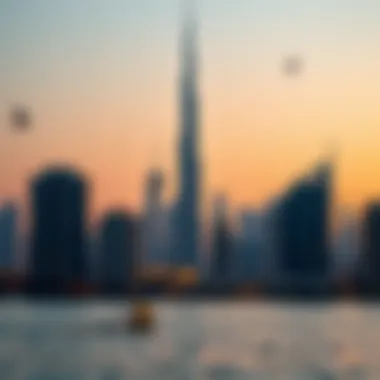
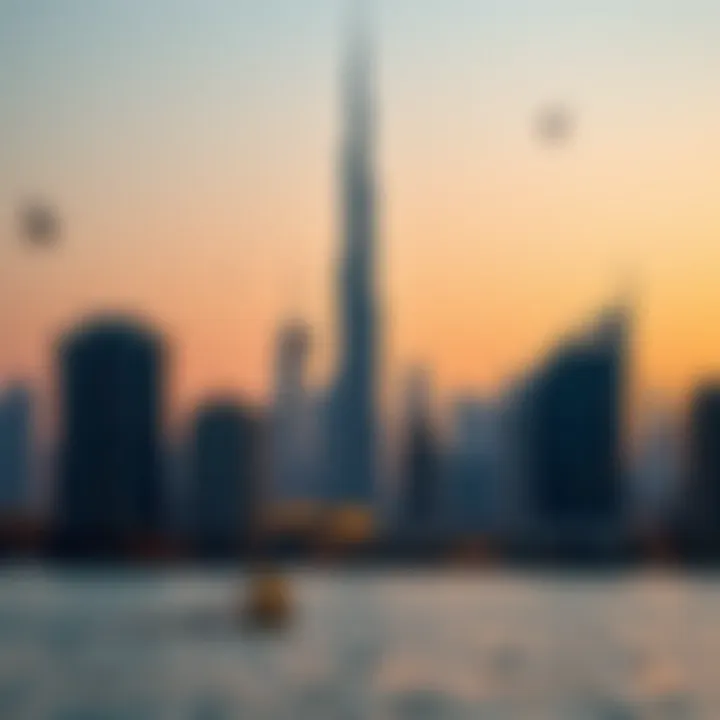
Intro
In the bustling heart of the United Arab Emirates lies Dubai, a city that has transcended its desert beginnings to become a global hub of trade, innovation, and luxury. However, for expatriates and investors contemplating a move to this shimmering metropolis, the question of safety is paramount. How secure is it to live in Dubai? What factors should be considered in assessing the perils and protections that come with life in such an expansive urban landscape? It's crucial to peel back the layers and examine the multifaceted aspects that define the safety environment in this dynamic city.
From concerns about crime rates to the quality of healthcare, each element intertwines to weave a larger narrative about the security of Dubai. Understanding the laws, cultural nuances, and the infrastructure in place can set a solid groundwork for making informed decisions. This article will delve into these elements, offering a comprehensive guide that illuminates the realities awaiting those who choose to inhabit this thriving urban space.
By navigating through statistical data alongside personal accounts, potential residents will glean a thorough understanding of what might lie ahead. Whether you are a first-time buyer exploring property options or a seasoned investor scouting for your next venture, this exploration aims to inform your journey in the vibrant streets of Dubai.
Prolusion to Safety in Dubai
Safety is a multifaceted aspect of urban living, and when it comes to Dubai, it deserves particular scrutiny. In a city renowned for its skyscrapers, luxury shopping, and thriving economy, ensuring the safety of residents stands as a priority that cannot be understated. Understanding safety in this dynamic metropolitan area is not just about the absence of crime; it encompasses various elements including health services, legal rights, and cultural norms. For expatriates and investors contemplating a move, grasping the nuances of safety can be the difference between a smooth transition and an anxious experience.
Understanding the Context
Dubai's safety landscape is shaped by its unique cultural, economic, and geographical context. Let's peel back the layers on this topic.
- Cultural Influences: The Emirati culture, deeply rooted in Islamic traditions, often leads to a society where harmony and respect for one another are highly valued. Violations of social etiquette can carry severe repercussions.
- Economic Stability: The strength of Dubai's economy contributes to a lower crime rate. High employment levels and a diverse job market diminish despair-induced crime, making it safer for residents.
- Legal Framework: The legal protections in place for both citizens and expatriates add an additional layer of security. There are stringent laws governing behavior, which combat activities that may compromise community safety.
- Community Engagement: The engagement of local communities and organizations plays a pivotal role in maintaining a safe environment. Residents often participate in neighborhood watch programs and other initiatives aimed at fostering safety.
- Weather Factors: Dubai's climate also poses unique considerations; extreme temperatures can influence outdoor activities and subsequently impact safety in public spaces.
Crime Rates and Security Measures
Ensuring safety in any urban setting goes hand in hand with understanding crime rates and the security measures in place. The importance of this topic cannot be overstated, as it serves as a foundation for how residents and expatriates perceive their quality of life. A low crime rate can significantly enhance the appeal of a city, while high crime rates can cast a shadow over its desirability. Within this section, we'll take a closer look at crime statistics and law enforcement presence in Dubai, providing a well-rounded perspective on the security landscape.
Overview of Crime Statistics
Crime statistics are a telling reflection of a city’s safety. In Dubai, the crime rates remain remarkably low compared to global standards. Reports consistently showcase that serious offenses such as violent crimes are few and far between. For instance, according to the Dubai Police, the crime index has notably declined over the past decade, making it one of the safest cities globally.
- Robbery and Theft: Incidents of theft, particularly in commercial spaces, have seen a significant drop thanks to robust security measures. While petty crimes might exist, the prevalence is relatively low.
- Assault Cases: The rate of physical assaults is significantly lower here than in many Western cities. The swift legal repercussions and the proactive approach of law enforcement deter such acts.
- Drug-Related Crimes: These offenses remain under control, with strict laws and frequent monitoring contributing to a comparatively safe environment.
In essence, potential residents can take comfort in the notable decline of crime rates in Dubai. This statistical landscape underscores the effectiveness of local law enforcement and community cooperation.
Law Enforcement Presence
A visible law enforcement presence acts as a powerful deterrent to crime. In Dubai, this presence is not only about the number of officers patrolling the streets but also about their approach to community engagement and crime prevention.
The Dubai Police force is known for being highly organized, well-trained, and utilizing modern technology. For instance:
- Community Policing Initiatives: Local police engage actively with communities, fostering trust and cooperation. Officers are often seen at community events, making them approachable and relatable.
- Modern Technology: With the implementation of smart surveillance and drones, security measures are advanced. The Emirate has invested in a network of CCTV cameras that keeps a close watch on public spaces.
- Emergency Response Units: The rapid response time of law enforcement to incidents is a significant factor that contributes to the city’s overall safety. Within minutes, help can arrive in case of emergencies, providing peace of mind to residents.
To sum up, Dubai's approach to crime reduction through visible law enforcement strategies has created a safe environment. This is crucial not just for current residents but also for potential investors and expatriates looking to settle in a secure urban setting.
“Low crime rates and proactive law enforcement make Dubai one of the safest cities worldwide, making it a compelling choice for expatriates and investors alike.”
The way crime rates are managed and the measures enforced by the authorities illustrate not only Dubai's commitment to safety but also its attractiveness as a city ripe for investment. All these elements combine to paint a picture of a city that prioritizes its residents' well-being.
Healthcare and Emergency Services
Quality of Healthcare Facilities
Dubai is home to a vast range of healthcare facilities, including world-class hospitals and clinics that adhere to international standards. Not only do these institutions offer advanced medical technology, but they also employ highly qualified medical professionals from around the globe.
- Public vs. Private Care: The healthcare system in Dubai consists of both public hospitals, managed by the government, and private institutions. While public healthcare is available to all residents, many expats often prefer private care for faster service and shorter wait times.
- Insurance Coverage: Health insurance is mandatory for all residents, which helps ensure that individuals have access to necessary medical services without facing exorbitant out-of-pocket costs. Various insurance plans offer comprehensive coverage, and many employers provide health insurance as part of employment packages.
- Specialist Availability: Whether it’s cardiology, orthopedics, or pediatrics, Dubai offers a wide array of specialists. This not only ensures high-quality care but also allows for convenient access to tailored medical services for specific health needs.
Furthermore, the emirate hosts numerous wellness centers focusing on preventive care, which encourages a health-conscious lifestyle amongst residents. It’s not just about responding to emergencies but also preventing them in the first place.
Emergency Response Systems
In the realm of safety, a robust emergency response system is crucial. Dubai has established a comprehensive network designed to respond swiftly to medical emergencies, ensuring that residents feel secure.
- Ambulance Services: The Dubai Corporation for Ambulance Services offers a fleet of ambulances equipped with advanced medical equipment and staffed by trained personnel. They are strategically stationed across the city to minimize response times and ensure quick access to medical care.
- Emergency Number: The emergency contact number, 999, is easily accessible to all residents and visitors. Training programs ensure that the personnel answering calls are well-prepared to handle emergencies efficiently.
- Community Initiatives: Local organizations and community groups frequently hold workshops on emergency first aid and CPR. This empowers residents to take action while waiting for professional help, reinforcing a culture of safety within communities.
"A community’s ability to be proactive in emergencies can significantly enhance the overall safety experience for its residents."
Overall, the strength of Dubai's healthcare and emergency services contributes profoundly to its reputation as a safe and secure place to live. These services not only protect the health of residents but also bolster their confidence that, in times of need, help is always just a call away.
Cultural Norms and Social Interaction
Understanding Local Culture
Dubai's culture is influenced by its rich history and the Islamic traditions that prevail in the UAE. The majority of the population is Muslim, and this shapes many elements of daily life, including dress codes, social interactions, and public behaviour.
It's important for expatriates to be aware of the following aspects of local culture:
- Respect for Traditions: Traditions play a significant role. For example, the holy month of Ramadan calls for fasting during daylight hours, which may influence work schedules and social interactions. Not participating in this can be perceived as disrespectful.
- Dress Code: While Dubai is more liberal than some other parts of the Middle East, modest dress is still advised, especially in public places like malls and markets. Wearing clothing that covers shoulders and knees is sensible to avoid any uncomfortable situations.
- Language and Communication: Arabic is the official language, but English is widely spoken. Yet, using a few Arabic phrases can go a long way in fostering goodwill. Simple greetings can break the ice and show respect towards the local culture.
Embracing these cultural aspects promotes a smoother integration into the community and reduces the likelihood of misunderstandings, thereby making residents feel more secure.
Navigating Social Etiquette
Social etiquette in Dubai can be intricate, given the diverse population. Here are essential tips to help navigate social spaces effectively:
- Greetings: A handshake is typical; however, it is important to note that men and women might not always shake hands. Always wait for the other person to initiate.
- Hospitality: Expatriates may be surprised by the warmth and hospitality often offered by locals. Accepting invitations to share a meal can help to build strong relationships, but be mindful of dietary restrictions that might stem from local customs.
- Public Behaviour: It’s crucial to adhere to the city's laws about public conduct. Displays of affection, such as kissing or hugging, should be avoided in public spaces. Similarly, using offensive language can attract legal consequences.
- Social Gatherings: When attending a social gathering, it's customary to take a small gift, like sweets or fruit, for the host. Expressing gratitude during and after the event is also important.
Always remember, understanding and respecting local etiquette is key to fostering good relationships and ensuring a sense of safety in societal interactions.


By adapting to local cultural norms and embracing social etiquettes, expatriates can pave the way for safer, more fulfilling experiences in Dubai. These factors not only enhance personal safety but also elevate community connections, which are vital in a city as dynamic as Dubai. For more insights on navigating cultural differences, check out resources like Wikipedia and Britannica that delve into the region's rich cultural heritage.
Safety in Public Spaces
Safety in public spaces is a crucial aspect of living in any urban environment, and Dubai is no exception. The city’s diverse population and vibrant lifestyle place an emphasis on ensuring that public areas remain secure and welcoming for everyone. Safety in these spaces affects not only individual experiences but also the overall appeal of the city for residents, expatriates, and potential investors. Let's explore what safety in public places means in the context of Dubai, focusing on specific elements, benefits, and considerations.
Transport Safety
When it comes to transport safety, Dubai showcases a range of attributes that contribute to a smooth and secure experience. The city has invested substantially in its transportation infrastructure. The metro service, which runs efficiently and connects major areas, is renowned for its cleanliness and safety. Trains are equipped with surveillance cameras, adding an extra layer of security.
Buses are a common means of transport and are well-regulated, featuring schedules that ensure reliability. Another aspect worth noting is the strict regulations surrounding taxi services. Taxis in Dubai are metered, and drivers are required to follow a code of conduct, minimizing the risk of disputes about fares. Moreover, rideshare apps like Uber and Careem operate in the city, providing options that allow passengers to travel securely with vetted drivers.
Additional Points on Transport Safety
- Traffic Regulations: Strict traffic laws help reduce road accidents, contributing to lower injury rates overall.
- Pedestrian Safety: Well-maintained sidewalks, pedestrian crossings, and traffic signals facilitate safe walking conditions, allowing people to navigate with ease.
- Public Awareness Campaigns: Initiatives aimed at promoting road safety help to educate residents and visitors alike about safe travel practices.
In summary, transport safety in Dubai is bolstered by a combination of efficient systems, stringent regulations, and community awareness, making it easier for individuals to navigate the city without fear.
Safety in Leisure Areas
Dubai’s leisure areas, such as parks, malls, and beaches, represent another vital component of public safety. These spaces are designed not only for enjoyment but also with security in mind. For instance, recreational zones like Jumeirah Beach and Safa Park have an array of facilities that include lifeguards on duty and surveillance systems to monitor activities.
Shopping malls in Dubai, such as The Dubai Mall and Mall of the Emirates, take safety seriously. Security personnel are present, and many shops and common areas are equipped with CCTV cameras. This presence helps deter criminal activity and provides a sense of comfort to visitors. Additionally, emergency response systems in malls ensure that assistance is readily available in the event of an incident.
Key Considerations for Safety in Leisure Areas
- Crowd Management: High traffic during holidays and weekends prompts malls and parks to enforce crowd control measures for the safety of all.
- Emergency Protocols: Establishing clear emergency exit routes and procedures is standard practice to ensure that individuals can evacuate safely if needed.
- Community Events: Many leisure areas host events and activities that promote social interaction while emphasizing safety protocols, further enhancing the overall feeling of security.
Effective management of leisure areas not only prioritizes safety but also encourages more community engagement, creating a healthier environment for all.
Legal Framework and Rights of Residents
Understanding the legal framework that governs life in Dubai is key for both new and existing residents. This framework isn’t just a set of rules; it serves as the backbone of safety and security for all who reside in this rapidly growing metropolis.
The laws in Dubai are designed to protect the rights and interests of its residents, offering a sense of stability amid the ever-evolving landscape. From regulations regarding employment and housing to public safety measures, knowing these legalities can greatly influence one’s experience in the city.
One of the standout elements of Dubai’s legal system is the clear guidelines provided to expatriates, who form a significant portion of the population. This clarity not only helps mitigate misunderstandings but also builds confidence among newcomers about their rights and responsibilities.
While the legal atmosphere is heavily influenced by cultural norms, it is also shaped by the necessity to maintain order and civility. For instance, defamation can lead to serious legal repercussions and understanding these distinctions can prevent unintentional pitfalls.
Legal Protections for Expatriates
Expatriates in Dubai benefit from various protections that ensure their safety and well-being. The legal framework actively promotes a non-discriminatory approach, making it essential for expatriates to know what rights they possess.
Here are several key legal protections that expatriates generally enjoy in Dubai:
- Work Contracts: All expatriates are assured of work contracts that clearly detail their rights, obligations, and entitlements. This helps prevent exploitation and establishes a formal baseline for employment.
- Housing Regulations: Laws are in place to ensure fair treatment in housing. Expatriates often have access to legal avenues to address disputes with landlords, ensuring their living conditions are not only suitable but also legally compliant.
- Judicial Support: The legal system provides a framework where expatriates can seek justice. This includes access to legal aid and representation if required, ensuring that they can navigate disputes with ease.
- Cultural Sensitivity Laws: Laws are in place to protect individuals against harassment or discrimination based on cultural background. These regulations foster an inclusive environment, vital for a diverse population.
Expatriate Testimonial
"Having an understanding of my legal rights made all the difference in my transition to life here. Knowing that I could seek help if something went wrong gave me peace of mind, and that’s invaluable."
A key consideration for expatriates is the understanding that while the legal framework does offer a robust safety net, awareness and active engagement with these laws are vital. Ignorance can sometimes lead to unintended legal issues, particularly regarding cultural practices that may differ from their home country.
In essence, the legal framework and protections afforded to residents in Dubai significantly contribute to the broader safety landscape. By promoting fairness, offering clear channels for redress, and respecting the diverse tapestry of cultures, the laws in Dubai not only ensure compliance but also foster a sense of community that is crucial for the safety and well-being of all its residents.
Economic Stability and its Impact on Safety
Economic stability is pivotal in understanding the safety dynamics of living in a place like Dubai. A thriving economy not only creates a more secure environment but also influences various aspects of daily life—from job prospects to social services. When one considers moving to Dubai, the economic framework serves as a foundational element to assess overall safety and quality of life.
Job Market Overview
The job market in Dubai is robust and diverse, encompassing sectors like tourism, finance, real estate, and technology. As a major global hub, it attracts a multitude of corporations and startups, generating numerous employment opportunities.
- High Employment Rates: Dubai boasts consistently low unemployment rates, often hovering around 2-3%. A healthy job market equates to financial security for residents, significantly decreasing crime rates and social unrest situations.
- Diverse Opportunities: Various industries cater to different skill sets, allowing expatriates to find jobs that match their qualifications and expertise. This diversity attracts skilled workers, promoting a sense of community and collaboration.
- International Firms: Renowned companies setting up shop in Dubai contribute to job security and economic growth. Their presence fuels local talent and offers employees career development through training programs and mentorship.
The implications of a stable job market extend beyond individual benefits; a thriving workforce supports local businesses, bolstering the economy and indirectly enhancing safety across communities.
Financial Security for Residents
Financial stability goes hand-in-hand with the broader economic conditions of a region. In Dubai, residents enjoy a favorable environment that nurtures investment and savings, crucial for their overall safety.
- Tax-Free Income: One significant advantage is the absence of personal income tax, allowing individuals to retain more of their earnings. This tax structure provides financial security—facilitating better living standards and reducing economic strain.
- Expanding Financial Services: The city is home to a myriad of financial institutions, including banks offering sound investment advice, affordable mortgages, and insurance products. These services not only enhance personal wealth but also promote responsible financial practices among residents.
- Real Estate Investment: With a booming property market, many expatriates consider investing in real estate. Ownership can provide significant capital growth and stability over time, which can act as a safety net during economic fluctuations.
In summary, a secure financial landscape tends to cultivate stable communities. When residents feel financially secure, they are less likely to engage in crime and more likely to contribute positively to society.
In Dubai, these aspects of economic stability are intricately linked to personal safety. By understanding the local job market and financial security, prospective residents—including investors, buyers, and expatriates—can better gauge the allure of life in this vibrant city.
Environmental Safety and Health Concerns
Dubai boasts a bustling economy and a cosmopolitan lifestyle, yet environmental safety and health considerations play a pivotal role in making the city a desirable place to live. A well-informed expatriate or investor must grasp how factors like air quality, pollution, and the local climate can impact daily life and long-term health. Understanding these aspects not only enhances the quality of life but also ensures a secure and healthy living environment.
It’s key to remember that the characteristics that make Dubai stand out also pose unique challenges. The rapid urbanization, construction boom, and increasing population density contribute to concerns regarding the environment. Adopting a proactive stance on these factors is essential for anyone considering making Dubai their home.
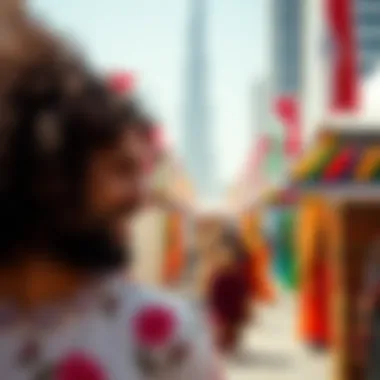
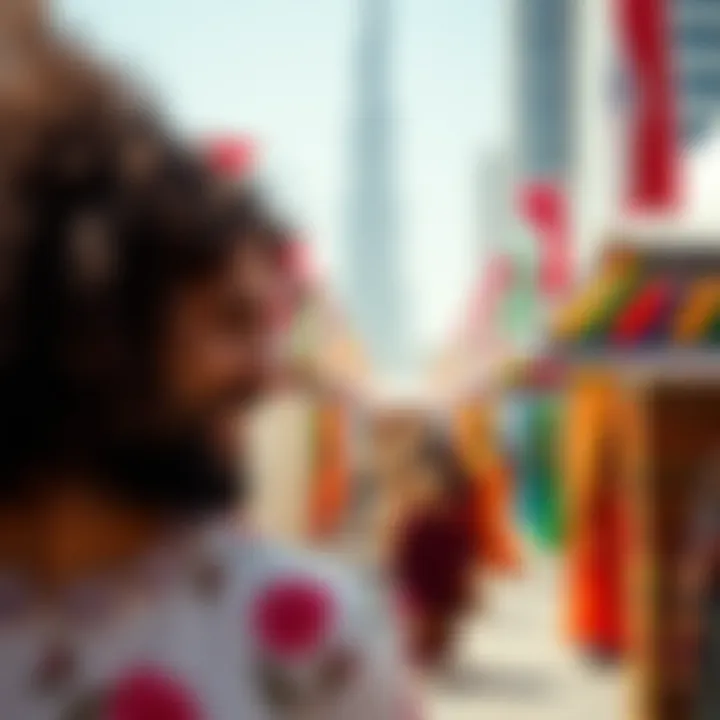
Air Quality and Pollution Levels
Air quality in Dubai is often a topic of discussion among residents and potential expatriates. With the city’s rapid development, air pollution has become a challenge. The primary sources of pollution include vehicle emissions, industrial activity, and construction dust. Although the government is making strides to enforce stricter regulations and promote cleaner technologies, the air quality can still fluctuate.
- Key observations regarding air quality:
- Dust storms: These are a frequent occurrence, especially during summer months. They can dramatically reduce air quality and visibility.
- Ozone levels: Due to the heat, ozone levels can rise, leading to potential health problems for those with respiratory conditions.
Residents are encouraged to stay informed about local air quality reports. Tools such as the UAE Air Quality Index can be handy in assessing whether it’s a good day for outdoor activities or if it’s best to stay indoors.
Health Risks and Local Conditions
When moving to a new country, understanding health risks is crucial. In Dubai, the scorching climate poses specific health considerations that new residents should be aware of. Heat-related illnesses are among these concerns, particularly for those unaccustomed to high temperatures. Here are some conditions to keep in mind:
- Dehydration: It’s easy to underestimate water intake during the hot months. Maintaining hydration should be a top priority.
- Sunburn and skin issues: The sun’s intensity can lead to sunburn if adequate protection isn’t taken. Wearing sunscreen and protective clothing can mitigate these risks.
Furthermore, the healthcare system in Dubai is well-equipped, with numerous private and public facilities. However, understanding the nuances of navigating the healthcare landscape can be beneficial. Expatriates can find comprehensive health insurance options to cover potential health issues, ensuring peace of mind.
"Living in Dubai means adapting to its unique environment, with awareness and preparation helping to ensure a safe and thriving experience."
In summary, recognizing environmental safety and health concerns when living in Dubai is vital. Staying informed about air quality, potential health risks, and accessing healthcare services can significantly improve residents' quality of life. As Dubai continues to evolve, being proactive in addressing these issues will help ensure safety for you and your family in this dynamic city.
Community Engagement and Support Systems
Community engagement is a cornerstone of safety in Dubai, as it fosters a sense of belonging and collective responsibility among residents. Knowing who lives next door and what values they hold can significantly contribute to a safer environment. This section delves into the role of community organizations and expatriate networks, showcasing their influence on building a secure living space for all.
Role of Community Organizations
In Dubai, community organizations play a vital role in linking residents to support systems, resources, and safety networks. These groups are often involved in various initiatives aimed at enhancing the quality of life for both expatriates and locals. Programs might include neighborhood watch schemes, social gatherings, and educational workshops focusing on safety and cultural understanding.
Benefits of community organizations are manifold:
- Enhanced Communication: They facilitate open channels of communication, helping residents voice concerns and stay informed about local issues.
- Resource Sharing: Many organizations provide access to important information about navigating life in the city, from public services to legal rights.
- Social Cohesion: Engaging in community activities fosters relationships that can lead to quick responses in case of emergencies, ultimately keeping residents safer.
The Dubai Community Development Authority (CDA) is one such entity that encourages community participation and offers various support services. Residents are encouraged to connect with groups or initiatives that resonate with their interests or needs, leading to a more robust and tight-knit community.
Expatriate Networks in Dubai
For new expatriates, the concept of safety is often intertwined with integration into local networks. Expatriate networks serve as informal safety nets, providing social support and practical advice on settling into life in Dubai. These networks can be found on social media platforms, such as Facebook groups or forums like Reddit, where members share experiences and tips.
The advantages of engaging with expatriate networks include:
- Emotional Support: Moving to a new country can be overwhelming. Connecting with others who have gone through the same experience can make the transition smoother.
- Local Knowledge: Expatriates often share valuable insights on everything from housing options to navigating bureaucracy, which can significantly enhance one's sense of security.
- Shared Resources: Many expatriate groups organize activities that promote community involvement, such as volunteering opportunities, which not only enhance the safety of neighborhoods but also contribute to personal development and fulfillment.
"A strong community can act as a shield, protecting its members and enhancing their quality of life."
For more insights about living in Dubai, visit Dubai Statistics Center or explore community forums on platforms like Facebook and Reddit.
Comparative Safety with Other Global Cities
Living in a global city like Dubai presents unique challenges and benefits when it comes to safety. To truly understand the safety landscape, it is essential to compare it with other major urban areas around the world. This comparison not only sets a benchmark but also highlights the effectiveness of local safety measures, cultural norms, and emergency services. By assessing Dubai's safety against cities like New York, Tokyo, and London, one can appreciate its distinct advantages and possible challenges.
A critical consideration is the feeling of security and the actual statistics that lead to that perception. While cities may vary significantly in crime rates, the level of community engagement and the presence of law enforcement can substantially impact one’s sense of safety.
Some benefits of considering comparative safety include:
- Understanding Benchmarking: By establishing a frame of reference with cities renowned for safety, potential residents can gauge how Dubai measures up.
- Informed Decision Making: Investors and expatriates can better evaluate their choices based on quantifiable metrics, ultimately influencing where they wish to reside.
- Tailored Safety Strategies: Homegrown solutions may emerge based on what has or hasn't worked well in other metropolitan areas.
Comparative safety analysis encourages best practices and adaptability in law enforcement and community programs. Throughout the years, evaluating global safety indices has taken center stage, leading to tailored approaches that address unique local challenges while addressing broader trends.
Evaluating Global Safety Indices
When assessing safety in Dubai relative to other global hubs, global safety indices come into play as a vital reference point. A few essential elements in this evaluation include:
- Crime Rate Comparison: Indices like the Numbeo Crime Index provide insights into different types of crimes, helping to delineate how safe a city feels on day-to-day activities.
- Response and Recovery: Evaluations often include how quickly emergency services respond and the efficacy of community support systems after incidents occur.
- Public Perception: Understanding resident sentiments about their safety can offer a nuanced view beyond mere statistics.
For instance, according to a 2023 safety report by the Global Peace Index, Dubai ranked notably higher in safety compared to other cities, making it attractive for families and business professionals alike.
While statistics provide a quantitative approach to safety, it’s the qualitative aspects such as community trust, cultural respect, and economic stability that paint a fuller picture.
Safety Concerns for Families
When considering a move to Dubai, families often weigh the balance between opportunity and safety. The city's sprawl, gleaming skyscrapers, and lively markets paint a picturesque backdrop, but beneath these visuals lies an intricate network of considerations that can significantly impact family life. Families are not looking just for a place to live; they seek a safe haven for their children, ensuring a space where they can flourish.
Education Systems and Child Safety
One of the cornerstones of family safety in any urban area is its education system. In Dubai, the educational landscape is rich and diverse. Families find a range of reputable schools following British, American, and International Baccalaureate curricula. These institutions are known not only for their academic rigor but also for robust safety protocols in place to protect students. Many schools have security personnel overseeing the premises, structured entry procedures, and emergency drills, allowing parents to rest easy knowing their children are safeguarded.
Parental involvement is also a noteworthy aspect of safety in education. Schools often maintain open lines of communication with families, helping to foster strong partnerships to address any concerns. Regular meetings between parents and educators are common, creating a collaborative atmosphere focused on student well-being.
Another key point in evaluating child safety in Dubai revolves around the cultural norms. The community tends to embrace a family-oriented ethos, and this communal spirit translates into a heightened awareness of the safety of children. Parents often share their neighborhood vigilance, looking out for one another's kids just about everywhere they go. For instance, children can be seen playing safely in parks under the watchful eyes of families nearby, creating a supportive environment.
Safety also extends beyond academics; it encompasses various aspects of emotional and psychological well-being. With initiatives promoting inclusivity and social responsibility, schools underscore not just the importance of education but nurturing well-rounded individuals. Programs to address bullying and emotional health are on the rise, making the atmosphere much more conducive to healthy growth for students.
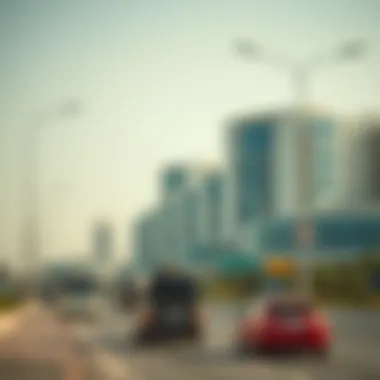
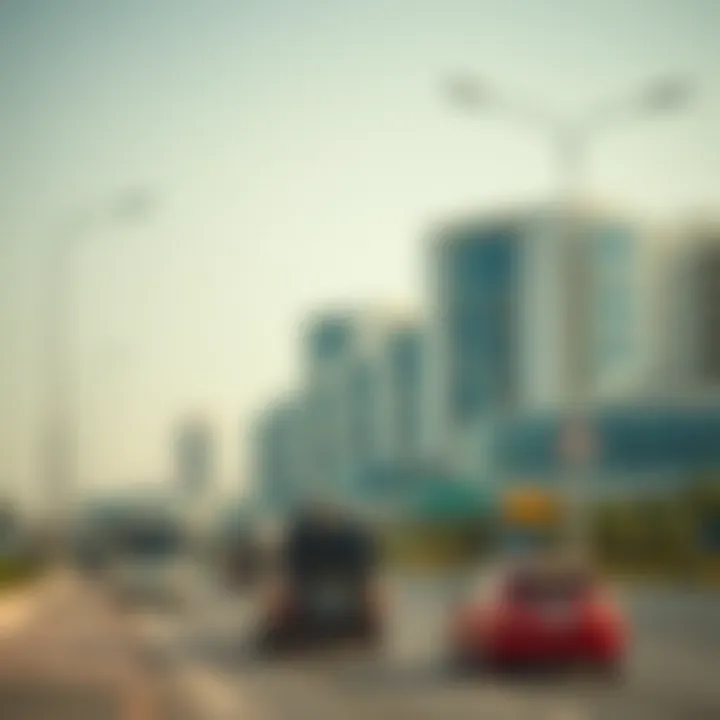
Here are a few considerations for families evaluating Dubai's safety:
- School Quality: Research and choose schools that align with your values and educational expectations.
- Community Engagement: Look for neighborhoods that promote family activities and peer support.
- Local Safety Programs: Investigate what local safety measures are carried out by both schools and communities.
- Cultural Compatibility: Understand the prevalent cultural practices around children and education.
"The opportunity for a well-rounded education coupled with community vigilance proves essential for families wanting peace of mind in a bustling city."
Ultimately, when considering the safety concerns for families in Dubai, it's clear that the blend of quality education, community spirit, and cultural values creates an environment that is favorable for raising children. Families gain the assurance that, while Dubai is a bustling metropolis, it still offers a safe haven where children can thrive.
Challenges Faced by New Residents
Relocating to a new city, especially one as vibrant and unique as Dubai, comes with its own set of hurdles. Understanding these challenges is crucial for anyone considering making this bustling metropolis their home. For new residents, grappling with cultural differences and ensuring their household and employment safety are key priorities that need addressing.
Cultural Adjustment Issues
Dubai is a melting pot of cultures, which can be as delightful as it is disorienting. For those moving from more homogeneous environments, the cultural mosaic can feel overwhelming. Newcomers often find it challenging to navigate the local customs, which come with distinct social norms and behavioral expectations.
For instance, what might be considered casual banter in one culture could be seen as disrespectful in another. Adapting to the various greetings, dining etiquette, and even clothing choices can take time. Importantly, understanding these cultural nuances helps prevent unintentional offenses, fostering smoother social interactions.
Moreover, expat gatherings and community groups can provide a supportive space for newcomers. Engaging with locals and veteran expatriates can bridge the gap, easing cultural shocks while creating a sense of belonging. Finding connections, whether through community centers or online platforms, can be pivotal in this adjustment period.
Household and Employment Safety
When it comes to household safety, new residents often harbor a mix of anxiety and care. Ensuring their living environment is secure is typically high on the list of concerns. It's advisable to consider various factors—neighborhood safety, the quality of building security, and access to emergency services. Many newcomers prefer to choose areas with established expat communities, which can contribute positively to their sense of safety.
In terms of employment, understanding local labor laws and job market standards is essential. The employment landscape in Dubai differs significantly from other regions, and expats must familiarize themselves with their rights and obligations.
Residents should ensure that their contracts are fair, protect their rights and provide job security. They must also be aware of the local economic climate, as market fluctuations can sometimes impact job availability. Networking through professional associations and attending industry events can further help in stimulating one’s career growth and securing a safe work environment.
Key Takeaways: New residents to Dubai face challenges both socially and in terms of safety. Adjusting to a new culture can be daunting, but seeking community support and understanding local customs are vital steps. Moreover, ensuring household and employment security hinges on knowledge of local regulations, neighborhood safety, and network building.
In summary, while the challenges faced by new residents in Dubai can be significant, awareness and adaptability can ease their transition. Effective navigating these hurdles is essential for creating an enriching living experience in this dynamic city.
Future Outlook on Safety in Dubai
Understanding the future outlook on safety in Dubai is essential for anyone considering a move or investment in this vibrant city. It's not just about the snapshot of safety today, but rather how the landscape is evolving. Rapid growth, cultural fusion, and infrastructural development are not just buzzwords; they define the living experience here and directly influence safety perceptions.
Plans for Infrastructure Development
When discussing safety, one cannot overlook the role of infrastructure development. Dubai has always been a city of ambition, and its plans for the future are no different. The government is heavily investing in modernizing and expanding infrastructure, which includes transportation, public services, and housing. This expanded infrastructure is crucial for safety in several ways:
- Enhanced Traffic Management: Plans for new roadways and smart traffic systems aim to reduce accidents and improve the flow of vehicles across the city. This results in safer commutes for residents.
- Public Transport Improvements: Upgrades to the metro and bus systems make it easier and safer for residents to navigate the city. Enhanced public transport reduces reliance on private vehicles, which can lead to safer streets overall.
- Emergency Services Accessibility: Enhanced infrastructure means improved access for emergency response teams. Quick response times can make all the difference in crises, and ongoing upgrades ensure that help is always just around the corner.
- Urban Planning for Safety: As new neighborhoods emerge, city planners are prioritizing safety in architectural designs. Efficient layouts, well-lit areas, and advanced surveillance measures are incorporated right from the planning stage.
"In Dubai, safety is not an afterthought; it’s built into the very fabric of the city. The future plans aim to create a safer, more secure environment for all residents and visitors alike."
The combination of improved transport networks and community design addresses safety directly. Additionally, as new projects roll out, they also bring awareness of safety practices to both expats and locals, encouraging sensible behaviors and community vigilance.
For investors and expatriates, this signals a strong commitment from the government. By investing in safety, the city becomes more attractive for high-value investments and affluent individuals, ensuring a dynamic and secure living environment.
Personal Experiences and Resident Testimonials
Understanding the real-life experiences of those living in Dubai can provide invaluable insights into the safety and overall quality of life in this dynamic city. Personal testimonies allow potential expatriates and investors to see beyond statistics and trends, offering a more holistic view of living in the UAE’s bustling metropolis. Hearing directly from individuals who've navigated daily life, adapted to cultural norms, and encountered various safety scenarios enriches the narrative surrounding safety in Dubai.
Benefits of Personal Accounts
When individuals share their stories about living in Dubai, a more detailed picture emerges that complements statistical data. Some key elements include:
- Humanizing Statistics: Crime rates can appear alarming in numbers, but personal accounts may reveal the nuances of such incidents. For instance, an expatriate may recount how quickly the police responded to a minor theft, providing reassurance about law enforcement efficacy.
- Diverse Perspectives: Experiences can vary greatly among residents based on their circumstances, backgrounds, and neighborhoods. A family living in Dubai Marina may have a very different experience compared to a single professional in Al Quoz, highlighting how context influences perceptions of safety.
- Real-life Solutions: Testimonials often include practical advice on navigating risks, from recommendations about safe travel methods to tips on interacting respectfully with locals. These insights are not found in guidebooks and can significantly aid newcomers.
Considerations on Sharing Experiences
While personal experiences are beneficial, they should be viewed critically. Here are some considerations:
- Subjective Nature: Individual experiences can vary widely, and what feels safe for one person may not resonate with another. Always consider the context of each story.
- Evolving Landscape: The safety environment in any city is subject to change. An incident reported five years ago may not hold relevance today as policies or societal norms shift.
- Cultural Sensitivity: Different cultural backgrounds can influence how people perceive and articulate their safety experiences. Acknowledging these differences fosters a more inclusive understanding.
"Safety here is like the skyline – tall and glossy. But like any city, it has its shadows you need to watch out for."
– A resident's parallel on navigating life in Dubai.
Real-Life Safety Narratives
These narratives often recount specific incidents or feelings associated with safety in Dubai. Below are a few synthesized stories that embody the essence of residents' experiences:
- A Comforting Police Presence: An expatriate mother recounts a time when her child lost a toy at the local park. The immediate and friendly response of nearby police officers in helping find it diffused her initial worries, reinforcing her faith in Dubai's safety measures.
- Navigating Nightlife: A young professional shares how, despite enjoying the vibrant nightlife in areas like Jumeirah Beach, she always sticks to trusted taxi services and stays alert in crowded areas. Her story highlights the trade-offs between enjoying nightlife and maintaining personal security.
- Community Connections: Another resident shared how engaging with community events, such as local markets or neighborhood parties, fostered a sense of belonging and mutual vigilance among residents. This communal approach not only enhances connections but also bolsters awareness and supports safety initiatives.
In closing, personal experiences and testimonials offer a vital dimensionality to understanding safety in Dubai. They remind us that behind every statistic, there exists a narrative shaped by feelings, resilience, and community, providing a nuanced landscape for both potential and current residents. This blend of narrative and reality enhances the diamond-like facets of safety in Dubai.
Epilogue: Weighing Safety in the Decision to Move
The topic of safety is paramount when considering a move to a new city, especially a bustling metropolis like Dubai. Understanding the various dimensions of safety—crime rates, healthcare quality, cultural norms, and infrastructure—can significantly influence one’s decision-making process. This comprehensive article aims to help prospective residents evaluate the safety landscape in Dubai, enabling them to make informed choices about their relocation.
Benefits of Assessing Safety in Dubai
When weighing the aspects of safety, it becomes clear that several key benefits emerge:
- Informed Decision-Making: Knowing the safety statistics can provide clarity. It offers prospective residents a roadmap of what to expect and prepares them for life in a new environment.
- Quality of Life: A safe community contributes to a higher quality of life. Potential expatriates should consider how safety impacts daily living, family life, and overall well-being.
- Cultural Integration: Navigating social norms is easier when one understands local customs. Safety goes beyond numbers; it encompasses feeling secure enough to integrate into society and to partake in community activities.
- Long-Term Planning: Understanding the future outlook on safety—through infrastructure developments and community support systems—can give long-term residents peace of mind. This foresight plays a critical role in financial planning and investment decisions.
Key Considerations
Several elements should be taken into account:
- Crime Statistics: Familiarize yourself with the latest crime rates and trends. Compare them to both global standards and other potential cities.
- Healthcare Accessibility: Evaluate how readily available medical services are in case of emergencies. A robust healthcare system provides a safety net for families and individuals alike.
- Legal Protections: Make sure to understand the legal rights available to expatriates in Dubai. Knowledge of legal frameworks can protect residents and their interests.
"Safety is not just the absence of danger; it’s the presence of peace of mind."







